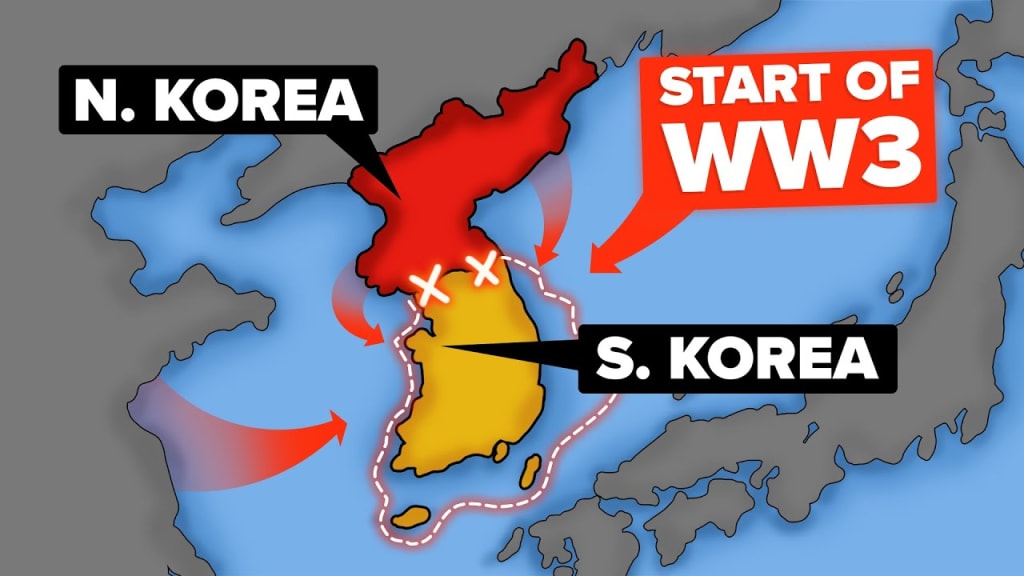Why is South Korea preparing for a full-fledged war?
South Korea is poised on the precipice of a catastrophic global conflict, stuck between many flashpoints. The country has the misfortune of being located in the world's most hazardous geopolitical zone. This has spurred South Korea to prepare to be the starting point for World War III! 💣🏴☠️💣

South Korea is poised on the precipice of a catastrophic global conflict, stuck between many flashpoints. The country has the misfortune of being located in the world's most hazardous geopolitical zone. This has spurred South Korea to prepare to be the starting point for World War III! 💣🏴☠️💣
Living between several flashpoints that all pose a threat of the next major world war, South Korea is on a knife's edge. A 51 million-strong country, South Korea is a significant economic force in the world, unlike its northern cousin. However, the country has the unfortunate position of being in the center of the most dangerous geopolitical region in the entire world. Due to this, South Korea has begun preparing to host the potential third world war, but the country's military and civilian populations are not yet prepared for such a conflict. The end of the Korean War—or, more precisely, the signing of the cease-fire, since both countries are still technically at war with one another—will be commemorated on March 20, 2023, seventy years after it began. The militaries of both sides are ready to resume a war that was paused nearly a century ago at any time, and the peninsula continues to be tense.
Both North Korean and South Korean forces are engaged in a battle for control of the demilitarized zone (DMZ) while having quick reaction forces on standby just a few miles away. Thousands of artillery pieces are threatening one another, but Pyongyang has the majority of the advantages. The first successful underground nuclear test by North Korea was carried out in 2006. The assumption that the United States would retaliate by invading the North immediately caused the entire world to briefly fear war. Diplomacy and sanctions were used instead of military action, but as relations between North Korea and the rest of the world grew tenser, Pyongyang was only emboldened to keep producing more nuclear weapons.
Fair enough, North Korea had no choice but to continue with its nuclear program. The nation had carefully studied what happened to other rebellious leaders who were overthrown by US forces. Nuclear weapons served as a guarantee of national survival and a negotiating chip for North Korea to thwart any US invasion. But they also made it possible for the country to keep its two regional rivals, Japan and South Korea, at risk. The North was not going to give up its nuclear arsenal, regardless of the cost to its economy or its own security. Several events in the 2010s, including the sinking of a South Korean naval ship by a North Korean submarine, led to a significant deterioration in the security situation on the peninsula. South Korea was caught in the crossfire as Kim Jong Un and American president Donald Trump made nuclear threats against one another on Twitter and boasted about the size of each other's red buttons.
As President Trump and Kim Jong Un decided to meet for talks—the first held between an American president and a North Korean leader—there was a glimmer of hope. The negotiations, however, were doomed from the start because North Korea was never willing to give up its nuclear program. The event cemented Kim Jong's position as the nation's supreme leader as propaganda hailed his success in compelling America to the negotiating table. Instead, Kim Jong used President Trump as a pawn in order to score important political points at home. The talks were a strategic coup for the head of state, who was surrounded by numerous senior officials vying for leadership positions. They helped to thwart any coup attempt.
When North Korea conducted ballistic missile tests over the airspace of South Korea and Japan, the situation ultimately deteriorated once more. Now that South Korea is working so hard to create a three-axis plan to counter any hostility from North Korea, relations with that country are quickly approaching an all-time low. This strategy depends on neutralizing North Korean kill-chain assets, assassinating the North Korean leadership in a depreciation strike, and enhancing air and missile defense to counter any North Korean ballistic missile attacks. A key component of the strategy is the Hyunmoo-5 ballistic missile, which can deliver a warhead 100 meters underground in order to destroy North Korean command bunkers. Weapons like the F-35 and this missile are also essential to the plan.
South Korea faces a growing number of aggressive Chinese forces in addition to North Korea's nuclear program. South Korea is caught in the middle of an escalating cold war between the United States and China, which is one of China's stated goals in Southeast Asia. North Korea's lone true ally and staunch supporter is China. North Korea's continued defiance of international sanctions to maintain its nuclear program is made possible by China and its exports to the country. North Korea is China's useful idiot because it is a major headache for the US and its Pacific allies and presents a strategic vulnerability in the event of war. The United States and Japan, who would unavoidably be allies in a war against China, could not simply ignore the threat from North Korea while waging war with China, so they were forced to divert some of their resources to prevent the hermit kingdom from acting out of line.
Additionally, China is very interested in preventing any reunification of the two nations, at least not one that is initiated by the South. A democratic Korean peninsula would inevitably align with the west and the US, increasing the US influence in the region, which is the last thing China wants. This would also put a US ally and yet another liberal democracy right on their doorsteps, posing not only a military threat but also a political one as Chinese people, growingly dissatisfied with the Chinese Communist Party, look to their neighbors and are inspired to yearn for democracy. Simply put, China will make every effort to prevent Korean unification from happening, despite South Korea's desire to avoid conflict with its much larger neighbor. If the United States is truly ejected from the region, then reunification led by the north, and inevitably by force, is almost certain to be on China's agenda.
China won't have any liberal democracies as neighbors if the US withdraws its military forces from the area. China is one of the greatest threats to the security of South Korea, whether they like it or not. However, the conflict in Ukraine increased tensions in Southeast Asia by shining a spotlight on China's ambitions in Taiwan. Taiwan will soon be united with China, either voluntarily or forcibly, according to Chinese President Xi Jinping, who has effectively guaranteed his position as the country's permanent leader. To this end, the Chinese navy has recently grown dramatically in size, sending more ships into the ocean annually than the United States, and it shows no signs of slowing down any time soon. Considering that Taiwan manufactures the majority of the world's semiconductors and cutting-edge microchips, China would control almost all of the world's supply of advanced electronic components if the island nation were to fall under its control.
This would grant China a disproportionate amount of influence almost everywhere in the world, effectively giving it veto-like power over a country's internal politics. China simply turns off the tap if any country dares to act against Chinese interests, and that country's economy collapses as a result of being cut off from the resources required for a modern technological economy. The US's first island chain containment strategy, implemented during the Cold War to contain communist forces in the Pacific, would be broken if China were to take Taiwan. Because South Korea would no longer be able to rely on the US navy for protection, China would be able to use its navy against it. South Korea, a country that depends heavily on international trade, has a stake in maintaining the current freedom of navigation that is supported by the strength of the US navy and its allies and enjoyed by all countries.
Because China has repeatedly demonstrated its willingness to use force and intimidation to impose its will on the high seas, South Korea's crucial economic lifelines would be directly under Chinese control if the US was forced out of the region. A global crisis of confidence in American leadership resulted from Donald Trump's presidency, which made things worse for South Korea. Donald Trump's isolationist tendencies and preference for autocrats have shaken the confidence of the world in America as an ally of the current democratic world order. America has long been seen as a guarantee of global stability thanks to its extensive network of alliances and partnerships. Despite the fact that he is no longer in office as president, his influence continues to be felt in domestic American politics.
The world is unsure of America's future dependability despite the fact that current American President Joe Biden has reaffirmed America's commitments to the international system and his support for Ukraine has helped to rebuild some confidence in the US. South Korea is currently pondering its own future in the event that the United States decides it is no longer interested in maintaining the stability of the western Pacific, much like the European Union has done. Both domestically and abroad, conditions are not good, and despite efforts to increase readiness, South Korea is becoming less and less able to meet its upcoming security challenges.






Comments
There are no comments for this story
Be the first to respond and start the conversation.